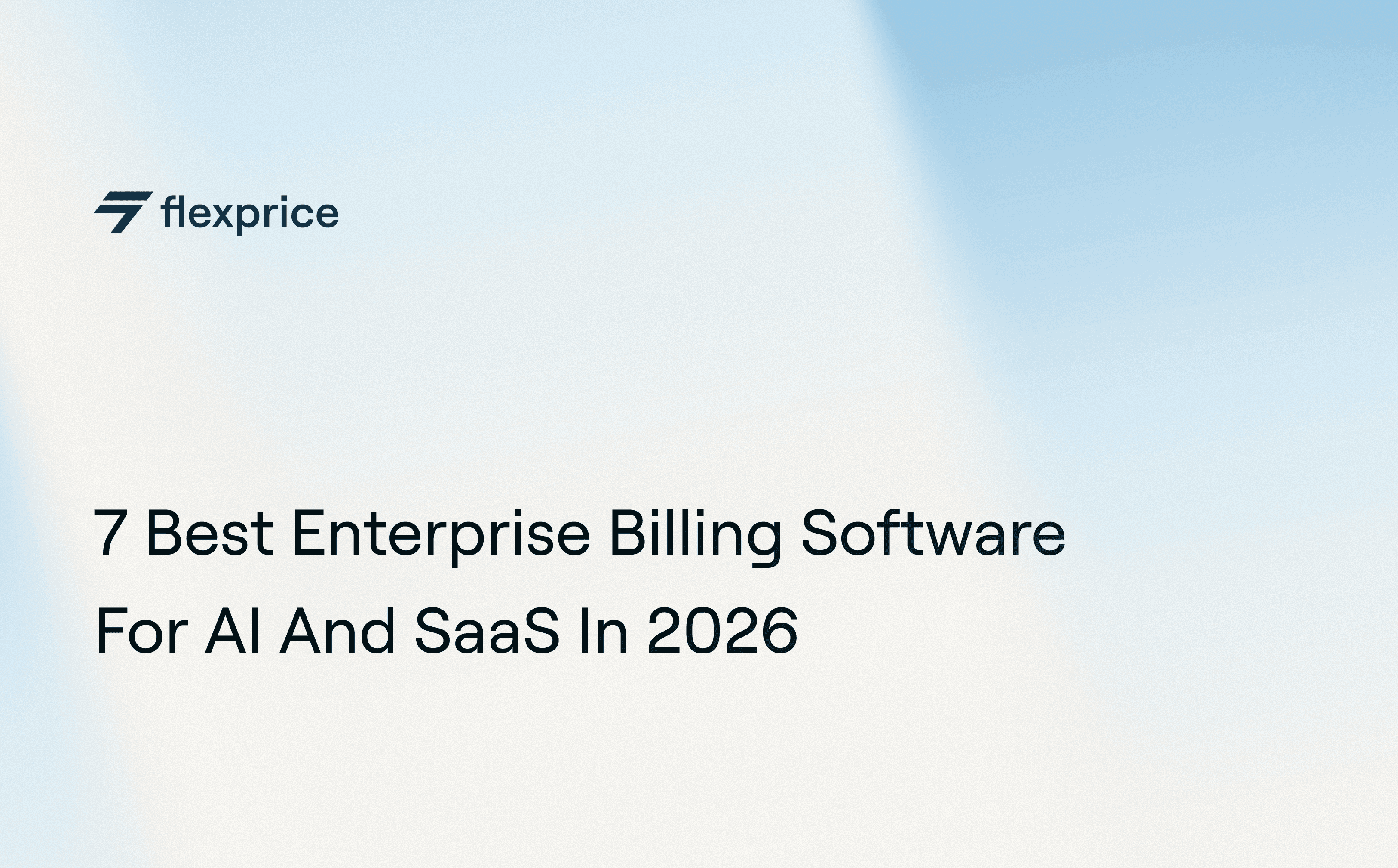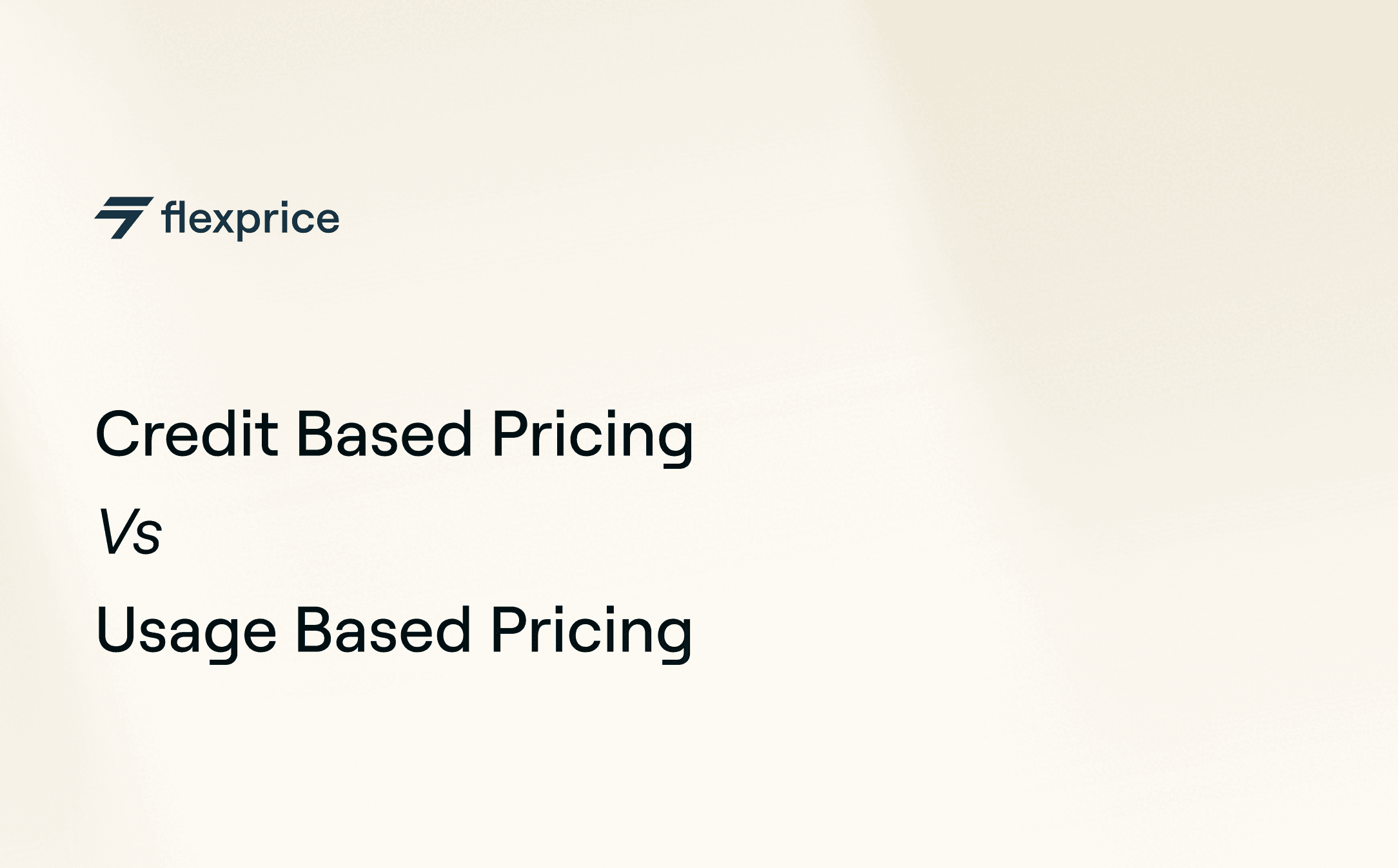 Aanchal Parmar
Aanchal ParmarCommit - Day 04 : Introducing Enterprise Billing Controls
Commit - Day 04 : Introducing Enterprise Billing Controls
Commit - Day 04 : Introducing Enterprise Billing Controls
Commit - Day 04 : Introducing Enterprise Billing Controls
Jul 3, 2025
Jul 3, 2025
Jul 3, 2025
• 6 min read
• 6 min read


Aanchal Parmar
Product Marketing Manager, Flexprice





Every new enterprise deal means another billing exception to configure. Customer A needs a 90-day trial period. Customer B requires $15,000 in usage credits with monthly resets. Customer C gets charged $1,500 while Customer D pays $2,500 for the same tier based on their negotiated rates.
Each of these custom arrangements forces you into a double-configuration nightmare: first setting up the pricing logic in your internal systems, then manually managing the customer-facing billing experience. You're juggling trial periods in your billing system, credit balances in your custom build infra, custom pricing in another tool, and trying to keep your customer portal in sync with it all.
This results in confused customers, constant interruptions from your sales team asking for "quick billing fixes," and hours spent on manual reconciliation instead of closing deals.
Today's update eliminates this configuration chaos. We're launching five new features in FlexPrice's enterprise billing workflows that bring native credit management directly into your billing system, handling everything from trial periods to custom credit allocations to variable pricing, all from a single interface.
Credit logic shouldn’t live outside your billing system
PLG products and enterprise deals both run on credits, just differently.
Some offer recurring monthly credits tied to plans and others issue one-time grants when onboarding new customers or signing large contracts.
Flexprice supports both and lets you configure when credits reset, how they expire, or which grants get used first.
Recurring grants
You can now configure recurring credit grants directly in your subscription plans:
Monthly plan? Grant 1,000 credits each month.
Annual plan? Grant 12,000 credits all at once or 1,000 per month.
You also define:
Grant amount (e.g., 100 credits/month)
Expiry logic
→ Credits expire monthly
→ Roll over until the end of the subscription
→ Or never expireGrant priority, which credits get consumed first if multiple grants exist
Example:
Apollo’s pricing isn’t just about features, it’s about how many credits each user gets. Every interaction on Apollo from email enrichment to contact exports, consumes credits.
But what makes their model really interesting is how they tie credit grants directly to the billing frequency.
Let’s say you sign up for Apollo’s Basic plan:
If you choose monthly billing, you get 2,500 credits every month.
If you switch to annual billing, you still pay per month (e.g., $49/user/month), but you now get 30,000 credits up front for the whole year.

Here the grant logic adapts based on your payment terms. Here’s where things get tricky without the right infra:
→ For monthly users, credits may reset cleanly every 30 days
→ For annual users, credits should be granted all at once, but optionally expire monthly or annually
→ If the plan changes mid-cycle (say a user upgrades), the remaining credits need to adjust accordingly
This logic works out-of-the-box in Flexprice. No cron jobs. No “benefits engine” you have to build and maintain.
One-time grants:
You can also define one-time grants:
On contract signing (“$10,000 worth of credits upfront”)
On signup (“500 bonus credits for first-time users”)
Each grant is isolated, tagged, and tracked with expiry rules just like recurring ones, but issued once per customer.
Flexible credit-to-currency conversion
Dollar-based pricing doesn’t always map cleanly to how your product works, especially when usage spans multiple features, models, or SKUs.
Flexprice lets you define a conversion factor between credits and currency, so you can price with precision and track usage without leaking revenue.
By default, 1 credit = $1.
But you can override this per wallet or per customer to set your own conversion factor.
For example:
Set 1 credit = $0.01 → 100 credits = $1
Set 1 credit = $0.5 → 2 credits = $1
This logic applies across:
Wallet balances
Usage tracking
Invoicing and payment
Credit grants
Once configured, Flexprice automatically applies the conversion during billing, ledger tracking, and payment deductions. Handle payments outside Stripe without breaking your ledger
Not all payments flow through your billing system.
Enterprise deals often close over email, paid via wire, and reconciled manually, days or weeks later.
Flexprice now lets you record those payments directly against any invoice, without leaving the system or breaking your ledger.
You can now record offline payments directly from any invoice without any additional steps or ledger patches.
Here’s what you can track:
Amount paid
Payment method (cash, card, bank transfer, UPI, etc.)
Reference ID (e.g., check number or transaction ID)
Notes (optional context, like who paid or when)
Payments can be:
Partial or full
One-time or staggered across multiple entries
Flexprice automatically logs the transaction against the invoice and updates the ledger.
Wrapping up
Real enterprise billing involves complex contract terms, wire transfer reconciliation, and multi-layered credit grant scenarios that standard billing solutions simply can't handle without extensive workarounds.
We're building Flexprice to eliminate the manual credit tracking and offline payment reconciliation that slow down enterprise finance teams and create friction in high-value deals. Every feature we ship is designed around one principle: your billing should handle enterprise complexity without breaking your workflow.
→ If you have any questions, talk to us
→ Sign up for launch updates to get tomorrow's drop in your inbox
See you on Day 05.
Get started with your billing today.
Get started with your billing today.


Aanchal Parmar
Aanchal Parmar
Aanchal Parmar
Aanchal Parmar heads content marketing at Flexprice.io. She’s been in the content for seven years across SaaS, Web3, and now AI infra. When she’s not writing about monetization, she’s either signing up for a new dance class or testing a recipe that’s definitely too ambitious for a weeknight.
Aanchal Parmar heads content marketing at Flexprice.io. She’s been in the content for seven years across SaaS, Web3, and now AI infra. When she’s not writing about monetization, she’s either signing up for a new dance class or testing a recipe that’s definitely too ambitious for a weeknight.
Share it on:



























